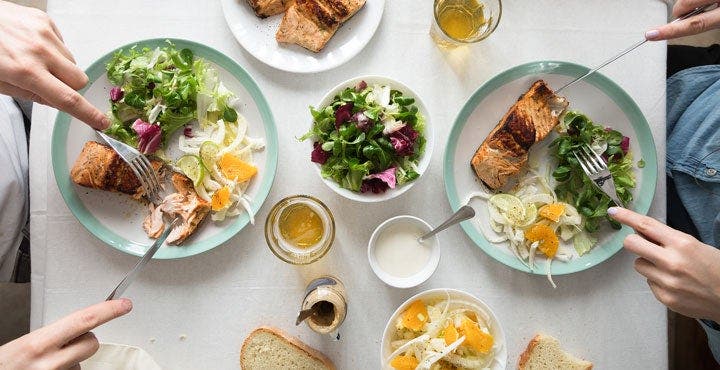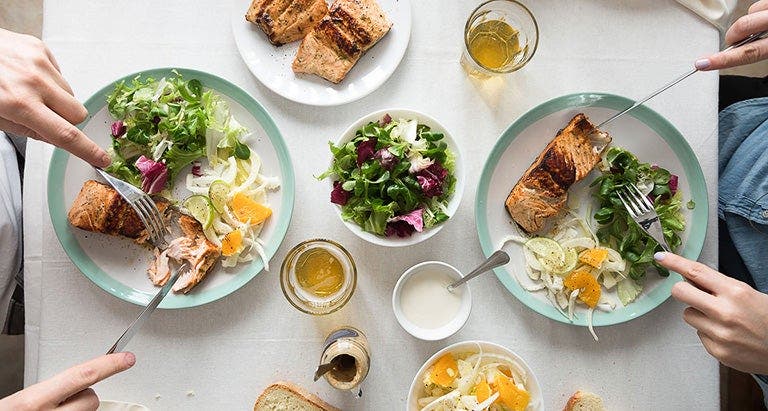What Healthy Eating Means After Breast Cancer


You’ve battled a disease that may well have seemed to take over your body and mind. You’ve focused on treatment and recovery. Now you’ve won your fight, it’s normal to question how to care for your cancer-free body, especially regarding nutrition. What should you eat for long-term health? How do you eat to lose weight and keep it off? And perhaps, whether one food, or one type of food, can prevent breast cancer (or keep it from coming back)?
Unfortunately, there’s no magic nutritional elixir that can guarantee health, says Colleen Doyle, MS, RD, the American Cancer Society’s managing director of nutrition and physical activity. However, some foods and nutrients may help keep you strong—and contribute to an overall diet designed for steady, healthy weight loss or maintaining a healthy weight.
Here are some suggestions on how to start your weight-loss journey:
Eat the rainbow
“The general cornerstone of post–breast cancer healthy eating is a plant-based diet,” says Stacy Kennedy, RD, a senior clinical nutritionist at the Dana-Farber Cancer Institute. Fruits, vegetables, whole grains, nuts and seeds, lentils, as well as some lean meats provide vitamins, minerals, phytonutrients, fiber, complex carbohydrates, and protein—all of which may help improve your health, she says. Plus, exhaustion can linger for cancer survivors—and these compounds may help boost both energy and metabolism.
But while some evidence suggests the antioxidants and phytonutrients in produce might be protective for some forms of cancer, it’s less clear which ones are the most protective, says Doyle. That’s why she suggests consuming a variety of colors: “Colorful fruits and vegetables tend to have the most nutrients.” (One exception: cauliflower—it’s white, but incredibly nutritious, she notes.)
A large study published in the American Journal of Clinical Nutrition followed more than 30,000 women for 20 years, looking at their nutrition and breast cancer. The findings associated higher levels of carotenoids in the bloodstream—antioxidants in bright foods like carrots and tomatoes, cruciferous veggies like broccoli and Brussels sprouts, and dark, leafy greens—to an 18 to 28 percent lower risk of breast cancer, and a reduced risk of recurrent tumors. So, make a rainbow—reds, oranges, yellows, greens, blues, and purples—of fruits and veggies the cornerstone of your daily diet.
Don’t forget fiber
Whole fruits and vegetables are also packed with fiber—and there’s some evidence that those who consume more fiber both before and after a breast cancer diagnosis may have a lower risk of dying from the disease, says Doyle. A high-fiber diet (25 grams a day is recommended for most women) may reduce circulating levels of estrogen, which have been linked with cancer cell and tumor growth, she explains. Fiber also may be filling and thus keep your appetite in check.
Know that not all fats are the same
Fats in food can present a unique challenge. Preliminary research has found some benefits to a low-fat diet (reducing your fat intake to 20 percent of each day’s calories) for breast cancer survivors, says Jennifer A. Ligibel, MD, director of the Leonard P. Zakim Center for Integrative Therapies at the Dana-Farber Cancer Institute. One study of nearly 10,000 breast cancer survivors found that a low-fat diet may significantly cut the risk of recurrence.
However, fearing all fat may not be the solution, says Doyle. It was big news in 2018, when research showed that women who followed a traditional Mediterranean diet chock-full of good-fat foods like olive oil, fish, and nuts had lower rates of breast cancer diagnoses (though the sample size of patients was small and more research is needed). She suggests avoiding the saturated fats in foods like red meat and upping your intake of healthy omega-3s, which may have anti-inflammatory effects that could potentially contribute to disease prevention.
Consider limiting red meat
When it comes to diet and disease—especially cancers—red meat often seems to dominate discussions. It’s no different with breast cancer. One Harvard study that followed nearly 90,000 premenopausal female registered nurses for 20 years found that regular red meat eaters who replaced one serving of meat daily with poultry in early adulthood lowered their overall breast cancer risk by 17%, and by 24% for postmenopausal breast cancer. “Eating less red meat may also keep you healthier in general and lower the risk of other chronic diseases, such as diabetes and heart disease,” explains study author Maryam Farvid, PhD, a visiting scientist at the Harvard School of Public Health. “If you normally have red meat twice a day, cut it to once a day. After a while, aim to limit it to three times a week.”
The World Health Organization’s cancer division—the International Agency for Research on Cancer—classifies red meat as probably carcinogenic, based on limited evidence, and processed red meat as carcinogenic, based on sufficient evidence (though it’s worth noting that it links consumption primarily to colorectal and pancreatic cancers, not breast cancer).
Eating chicken, turkey, fish, nuts, and beans probably won’t increase your risk of breast cancer, says Farvid. Yet too much red meat that’s high in “heme iron,” or dietary iron that comes from meat, may interfere with your body’s ability to regenerate healthy new cells. It’s also high in saturated fat, which has been associated with higher levels of estrogen and can play a role in breast cancer development. And watch out for bacon, pepperoni, and cold cuts. Processed meats usually contain nitrates, which have been linked to several kinds of cancer.
You don’t need to give up the occasional ballpark hot dog—but if you’ve been eating lots of red meat, it may be time to cut back, Doyle says.
Don't stress over soy
“When you talk to breast cancer survivors, they always ask about soy,” says Doyle. Compounds in soy called isoflavones may act like weak estrogens in your body—and, as mentioned, that’s not ideal when it comes to breast cancer cell growth. There has been concern that a breast cancer survivor might be putting herself at risk for recurrence by eating soy, she explains. The reality? The American Cancer Society doesn’t view soy as harmful. And Doyle suggests that it might even be helpful.
Case in point: A study in The American Journal of Clinical Nutrition found that women with breast cancer who consumed 10 mg or more a day of soy isoflavones (for reference, you'd get about 17 mg of isoflavones in 2/3 cups of cooked edamame) had a 25% lower risk of recurrence than those who ate 4 mg or fewer a day. “Soy foods are healthy and a good alternative to red meat,” says Doyle. “You can feel perfectly safe snacking on edamame, drinking soy milk, and eating tofu in your stir-fry.”
Eat to maintain a healthy weight
You’re eating to help work toward and fortify your healthiest body, which in turn may give you the best chance at feeling great for years to come. More and more research links appropriate post-cancer food choices to a healthier outcome down the line. And the American Cancer Society’s guidelines for long-term, disease-free living after cancer include specific dietary recommendations, as well as directives for reaching and maintaining a healthy weight.
Making mindful eating choices and building an understanding of portion sizes are two strategies many people find helpful. As a starting point, Doyle suggests plating serving sizes of different foods to see what they look like in a real-life setting.
A registered dietitian who specializes in oncology could also be helpful, says Kennedy. And remember this: You had no control over your illness, but you're in charge of how you move forward. And that's a beautiful thing.
--
This article was reviewed for accuracy in September 2021 by Angela Goscilo, MS, RD, CDN, manager of nutrition at WeightWatchers®. The WW Science Team is a dedicated group of experts who ensure all our solutions are rooted in the best possible research.
